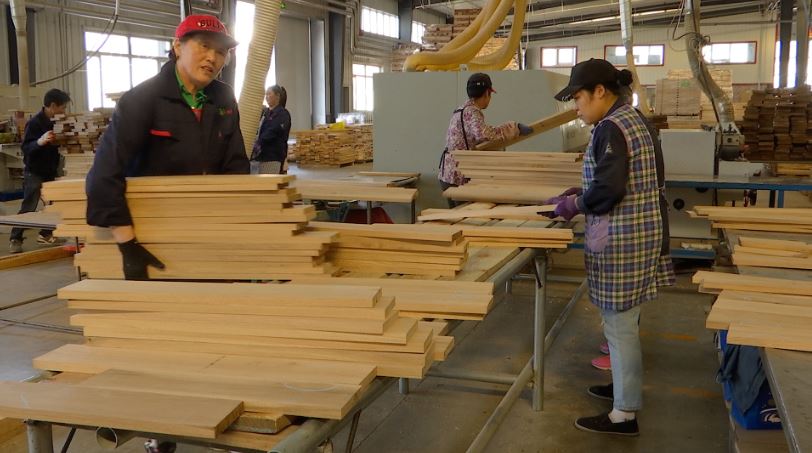
Initial processing of timber at Suifenhe factories. (Photo: CGTN)
Sitting on China's northeastern border with Russia is Suifenhe, the largest port with Russia in the region and also China's largest distribution center for Russian wood. Scores of Russian logs flow into the Chinese market every day and now a fresh free trade zone may make Suifenhe the mecca of timber and lumber trade and processing, and the region and world may soon reap the benefits.
Early this year, one of China's largest wood flooring manufacturers set its branch in Suifenhe, attracted by the abundant timber resources of Xylosma; a kind of log behind a popular type of hardwood floor, giving it a fine color, pattern and hardness. Xiong Quan, a manager of the company's Suifenhe project said Russia abounds in Xylosma and can provide over 20,000 cubic meters of Xylosma each year for floor making.
Now the flooring company has become one of the first to get a business license in the region's new pilot free trade zone, which has just gone under construction along with the creation of a China-Russia timber trading and processing center, all of which aim to improve trade ties with the neighboring countries while boosting the border region.
Xiong Quan believes that the company will benefit from governmental support for costs and logistics. And they hope to help upgrade the local wood industry from trading to a whole wood processing industrial chain. "We've already reached deals with our partners and suppliers. All we need to do now is finalize our automatic production factory," he added. In the next year, the company expects to turn these piles of timber into at least one million square meters of wood floor.
As China-Russia strategic partnerships reach a new level, the authorities' increased efforts to work together in wood, grain and border-region development are all underway in Suifenhe. That ushers in opportunities for Chinese manufacturers and also Russian wood exporters.
Ludmila Vasyukova from Russian Far Eastern Federal University said Vladivostok free port is implementing certain tax incentives to help the wood trade with Suifenhe, which is quite attractive for Suifenhe's wood processing industry. "I think the next step for the two countries should be to deepen technological cooperation with respective strengths to further promote our wood-processing industry," said the expert.
Industry insiders are confident that their businesses will grow bigger in the new free trade zone, and go global through the northeastern gateway to reach northeast Asia and a wider Belt and Road region. More importantly, a fully-fledged free trade zone will do much more than lay the groundwork for improving lumber industry. It is also the foundation for further opening economic ties between China, Russia and a host of other nations.


